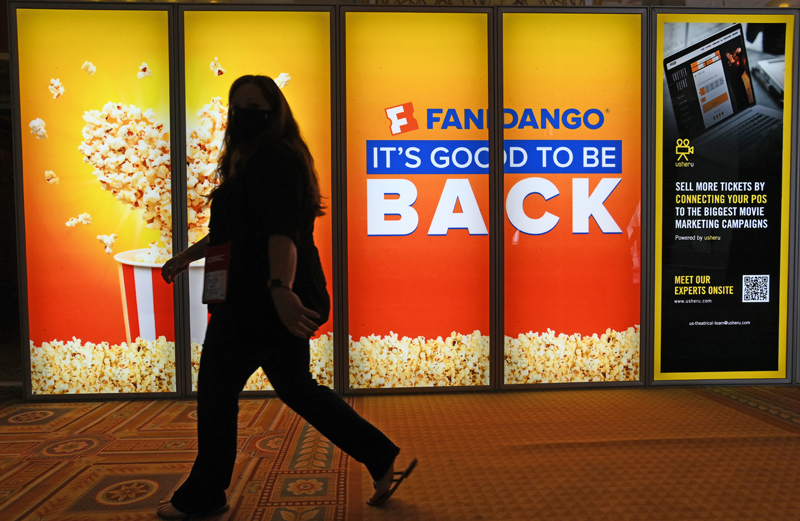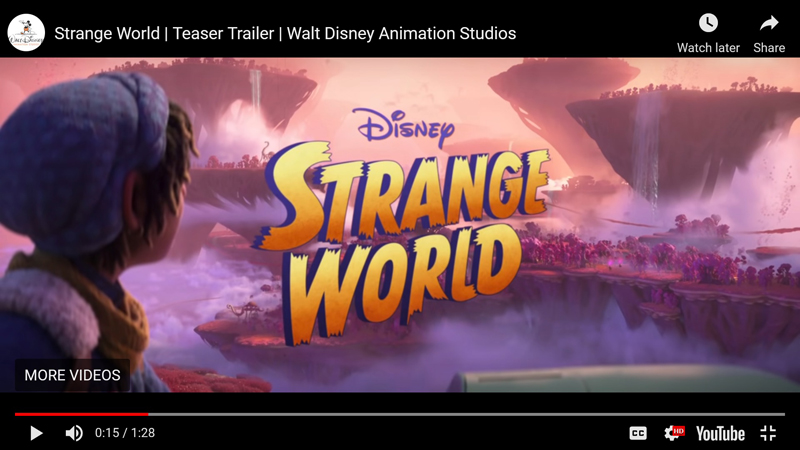Release windows for theatrical and video-on-demand in the streaming age are unsettled, suddenly experiencing significant upheaval across the globe.
An animated Disney film skips theatrical in France (see accompanying “Strange World” image) to go straight to Disney+ streaming. And a separate Apple TV+ deal for a Brad Pitt movie reportedly incorporates an unprecedented combination of cinema and streaming distribution for talent pay, in what are the latest jolts to the streaming status quo.
Walt Disney Studios dropped a theatrical run in France in November for animated “Strange World,” reportedly because of difficulty navigating the territory’s heavily regulated film business. Losing a full-length animated Disney feature rattled the French cinema industry, which worries it may “start a trend of Hollywood projects skirting France’s onerous regulations dictating the length of an exclusive theatrical release in favor of premiering on streaming services,” says an article by Elsa Keslassy in Variety.
Earlier this year, Netflix agreed with French film regulators to reduce the exclusive theatrical window before video-on-demand (VOD) runs. It is now official that streamer Netflix will be able to show movies 15 months after their theatrical releases, which is still a long window holdback by global standards of 1-3 months. But 15 months is reduced from a normal 36-month mandatory window in France previously. The deal means Netflix-controlled films can again screen at the prestigious Cannes Film Festival, which is a potent global marketing platform that had been off limits for Netflix films without cinema runs in the territory.
In a what could be a Hollywood milestone and precedent-setting deal, actor Pitt is attached to an untitled Formula One car racing film that Apple TV+ video streaming service agrees to take after a theatrical run, or window. “Instead of a token release in a small number of theaters or a day-and-date opening, the movie would have an exclusive — and global — run of at least 30 days before heading to the Apple TV+ platform,” says a Hollywood Reporter story by Borys Kit. “One source says it could even go as high as 60 days.” Day-and-date refers to a simultaneous release on multiple platforms at once.
“Apple has released movies in theaters before, with animated film ‘Wolfwalkers’ enjoying a 30-day window and ‘The Tragedy of Macbeth’ getting 21 days,” says the Hollywood Reporter article. “However, those were small-scale awards play releases, not tentpole-style extravaganzas.”
The pay structure for talent in the Pitt-fronted car-racing film — which seems to be a first— relies heavily on theatrical release. That’s significant because it points to cinema coexisting with subscription-VOD, and theaters not being wiped out as some pundits suggest.
Pitt; director Joseph Kosinski (who helmed blockbuster “Top Gun: Maverick”); “Maverick” screenwriter Ehren Kruger; prolific producers Jerry Bruckheimer and Chad Oman of Jerry Bruckheimer Films; and possibly some others will pocket half of theatrical rentals (meaning the distributor portion of boxoffice, or what’s left after theaters pocket their cut of cinema ticket revenue).

“The unique deal, in essence, pays the creative team three ways: their upfront fees, their hefty buyout fees and the theatrical backend,” the Hollywood Reporter article says. Buyout fees refers to a negotiated payment that streamers pay to talent for streaming rights, since streamers typically take all rights globally; they don’t let their own originals play elsewhere (so no cable TV runs, for example) and no segmented runs in various overseas territories, all of which trigger talent fees in traditional distribution methods.
Apple TV+ is riding high having acquired for $25 million Oscar Best Picture winner “Coda,” the family drama about deaf persons, in an auction after the independently made film was screened at the Sundance Film Festival a year and a half ago.
Another new wrinkle is what happens to the film library of MGM — the former major studio possessing the historic United Artists catalog — after Amazon concluded an $8.5 billion acquisition of the studio in March. The MGM library includes James Bond spy adventure movies, the Rocky dramas and 4,000 other theatrical films of the past (plus 17,000 episodes of primetime TV series). Will Amazon cease traditional licensing that library content to third parties? Those third parties range from pay TV in Latin America to broadcasters in Europe to streamers, which is customary. Amazon could opt to keep MGM titles on corporate sibling Amazon Prime streaming service. If so, the only way to ever to see a James Bond film on streaming or TV is subscribe to Amazon Prime. (“No Time to Die” just debuted for free screening on Prime.)
Elsewhere in Hollywood, Warner Bros. Pictures and its corporate streaming sibling HBO Max recently came under new ownership of the reality cable TV giant Discovery. The new owners are expected to break with convention in streaming, given they come from outside the major studio system. The new owners have their pre-existing streaming platforms available for bundling and crossover integrations.
Cinema is tapping into streaming technology with non-theatrical content and movies being with Los Angeles-area-based startup MetaMedia handling service. Non-theatrical content includes red-carpet events, special fan events, teleconferences for corporate clients, educational presentations and even Magic Screen Interactive Animated Content with avatars interacting with the audience.

U.S. movie theaters got their swagger back when Wall Street downgraded streaming in the wake of disappointing Netflix quarterly earnings in April, coincidentally just as the cinema owners association was holding its annual convention/trade show. One element of renewed prowess by cinema is movies being marketed with “cinema only” tags in messaging to consumers.
Based on current turmoil, the landscape is in flux with crosscurrents and doesn’t seem to ready to settle into uniform cinema template that was the case before VOD disruption.
As for turmoil, some movies originally planned for theatrical skip cinema for premiere in streaming, mainly as major studios want to bolster corporate sibling streamers with flashy exclusive titles. These films are mostly middle- and lower-tier where a calculation is made that they would not be successful in theatrical runs; top titles almost always go theatrical.
On the other hand, analysts now feel that the streaming industry is maturing faster than originally expected, lowering the ceiling on profits and increasing economic pressures among platforms, including high subscriber turnover in churn.
Related content:

Leave a Reply